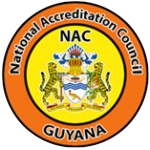- 109 Barima Avenue, Bel-Air Park, Georgetown, Guyana
- info@nac.gov.gy
Equivalency or Recognition
Equivalency is an evaluation to determine the status, level and comparability of different programmes of study.
The Equivalency of Qualifications is the process of formally establishing as to whether two or more qualifications are equal or deemed to be equal or comparable in value.
APPLICATION FORM
An application form can be uplifted from the Secretariat of the National Accreditation Council (NAC), 109 Barima Avenue, Bel Air Park Georgetown or downloaded from its website at www.nac.gov.gy. A form must be accurately completed in its entirety and submitted with the relevant supporting documents for EACH qualification. ONE qualification/award shall be processed as ONE application and an applicant shall pay a separate fee for EACH qualification/award.
Multiple applications on one form shall not be entertained.
FEES
Individuals applying for a Statement on Recognition or Recognition and Equivalency, are required to pay a processing fee of GYD$5,000.
Institutions/Organisations applying for a Statement on Recognition are required to pay a processing fee of GYD $60,000.
Fees should be paid by a Manager’s cheque payable to the National Accreditation Council or to Account number 001036805012 at GUYANA BANK FOR TRADE AND INDUSTRY LTD, Water Street Branch.
PROCESSING TIME
NAC will process the application in a minimum of three weeks or fifteen (15) working days. The time of processing commences when all of the required documents and other information would have been received by the Council. Should the Council require additional time to process the application, the applicant will be informed accordingly.
REQUIRED DOCUMENTS
Applicants are asked to present the following original documents and notarised/certified copies (where applicable) when making an application submission:
- Valid form of identification for applicant and proxy (if used)
- Original certificate/award
- Academic Transcript (Official)
- Deed poll or marriage certificate if a change of name applies
- Deposit slip from payment transaction
- Official translation of documents to English, if written in a foreign language, from a translating agency recognised by the Council such as, Embassies and certified translators.
Additionally, applicants are required to request an official transcript from the institution which awarded the qualification. The Council reserve the right to request any additional information directly from the institution(s) the student attended or to consult with the institution(s) for any pertinent information – that may assist in the processing of the application. The applicant shall bear the cost of such activities where incurred and information shall be sent directly to:
The Executive Director
National Accreditation Council of Guyana
109 Barima Avenue
Georgetown
Guyana
For further information and clarifications before starting the application process, please contact the Council at:
Tel: (592) 223-7901/ 225-8360/ 225-9526/ 225-7662
PLEASE NOTE THAT ANY INSTANCE OF FALSIFICATION OF INFORMATION WILL BE REFERRED TO THE CRIMINAL INVESTIGATION DEPARTMENT, GUYANA POLICE FORCE.
| CRITERION 1 | GOVERNANCE |
|---|---|
| Criterion Statement: | The awarding body’s corporate governance arrangements are based on robust and transparent governance, organization and management. |
| Standard 1.1: | The awarding body has been established in accordance with the regulatory requirements of the country of origin. |
| Examples of Evidence |
|
| Standard 1.2: | The awarding body assigns a single, named point of accountability for maintaining quality and standards of all qualifications. |
| Examples of Evidence |
|
| Standard 1.3: | In cases where an awarding body offers qualifications in a partnership or in consortium with other awarding bodies, there exists a clear written agreement for each organization’s responsibilities. |
| Examples of Evidence |
|
| Standard 1.4: |
|
| Examples of Evidence |
|
| Standard 1.5: |
|
| Examples of Evidence |
|
| CRITERION 2 | ADMINISTRATION |
|---|---|
| Criterion Statement: | The awarding body has sufficient and committed financial, technical and staffing resources to support the range of qualifications it intends to offer for the life of its qualifications. |
| Standard 2.1: | The awarding body has the financial capacity to sustain its operation |
| Examples of Evidence |
|
| Standard 2.2: | The awarding body has procedures in place to ensure that its own staff and/or associates are competent and have access to appropriate training and guidance. |
| Examples of Evidence |
|
| Standard 2.3: | The awarding body is supported by adequate physical and information technology infrastructure |
| Examples of Evidence |
|
| Standard 2.4: | The awarding body has an appropriate policy that ensures equality of opportunity for all candidates. |
| Examples of Evidence | 2.4a Documented policies and equality of opportunity that are approved and communicated to all stakeholders. |
| Standard 2.5: | The awarding body has procedures for assessment that minimize the possibility of fraud. |
| Examples of Evidence |
|
| Standard 2.6: | The awarding body provides reasonable and reliable customer service for its centre and candidates. |
| Examples of Evidence |
|
| Standard 2.7: | The awarding body has a comprehensive system for monitoring and evaluation that ensures quality and promotes continuous improvement of all aspects of its qualifications. |
| Examples of Evidence |
|
| CRITERION 3 | PLAN AND PROVISION |
|---|---|
| Criterion Statement: | The awarding body has an appropriate plan for development and accreditation of new qualifications, amendment of existing qualifications, and withdrawal of accredited qualifications. |
| Standard 3.1: | The awarding body has clear, well-articulated procedures and processes for the development of new qualifications. |
| Examples of Evidence |
|
| Standard 3.2: | The awarding body is committed to reviewing its existing qualifications to determine continued relevance and fitness for purpose |
| Examples of Evidence |
|
| Standard 3.3: | The awarding body is committed to continued growth in the range of qualifications it offers so as to meet the education and training needs in the country in which it offers its qualifications. |
| Examples of Evidence |
|
